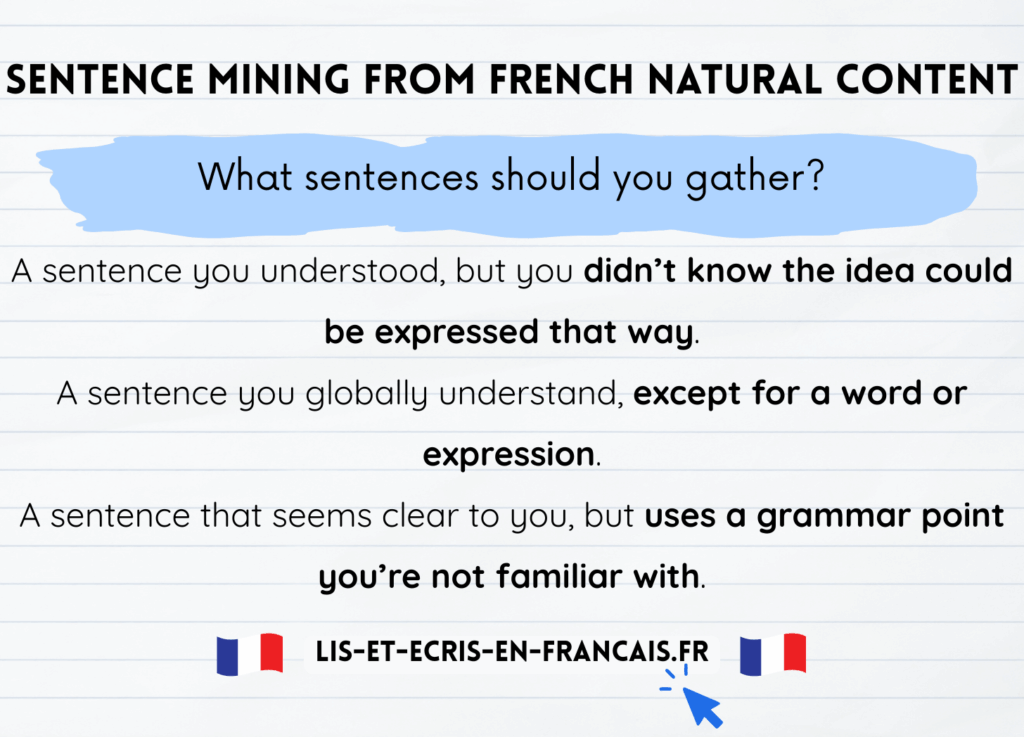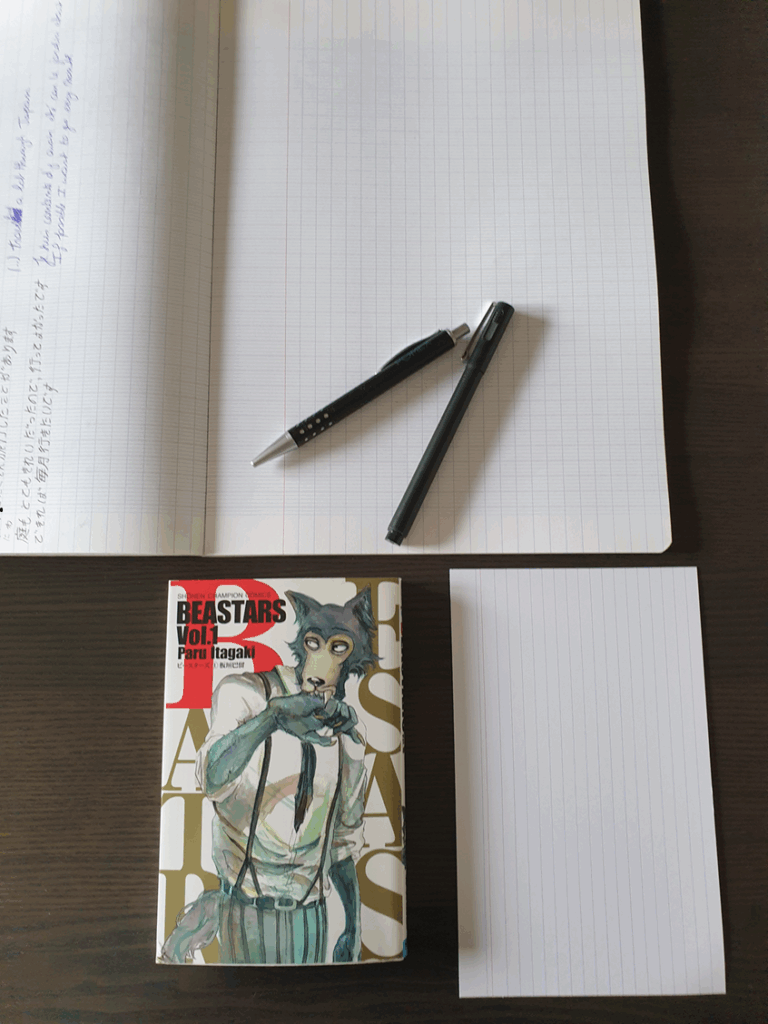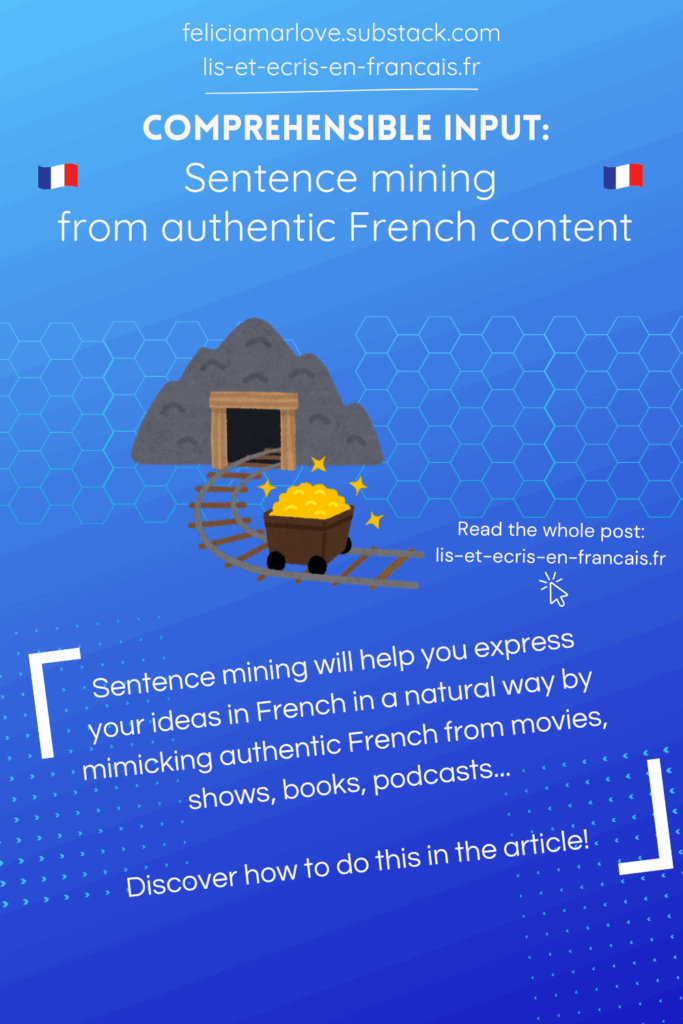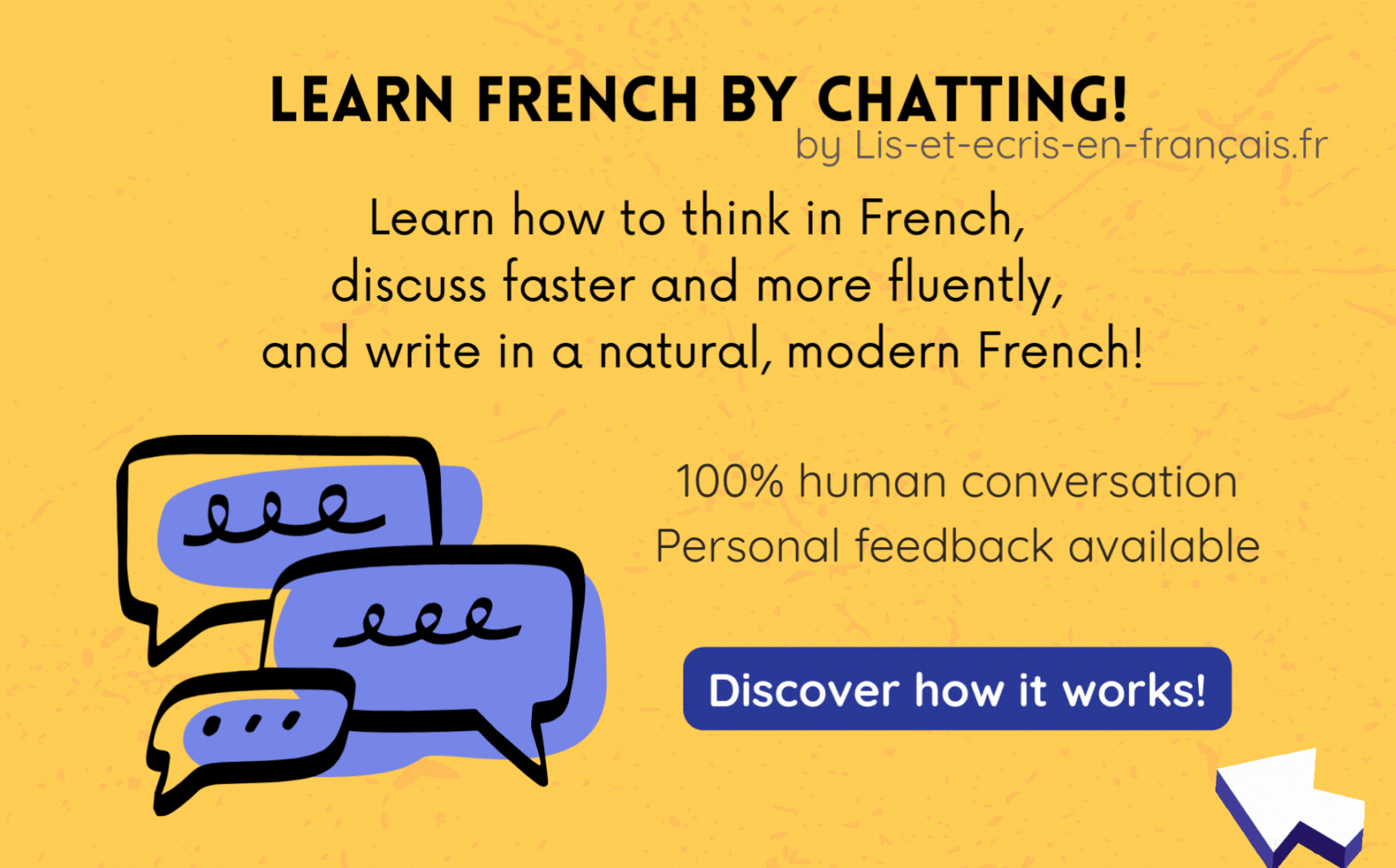In order to learn French by acquisition or immersion, you can use comprehensible input suitable for your level. This comprehensible content can be books, videos, articles, movies, series, podcasts… anything as long as the level is right for you.
You can just use this content to immerse, or take it one step further and start mining interesting sentences to reuse them. In this post, I’ll explain how I personally use sentence mining to learn a language, how to apply it to different kind of contents, and what to do with your collection of sentences.
Hey, did you know all my articles are available in French? If you’re learning French, I strongly advise you to practice by reading the original French version first, and use the English version for support, if needed. You can always switch by using the language option in the top bar menu. Please note the English version is not a literal translation.
What is sentence mining?
Sentence mining means collecting sentences or expressions from authentic content in the language you’re learning, in order to reuse them later. It allows you to express yourself more naturally by forming sentences based on genuine examples from native speakers.
Instead of studying vocabulary and grammar, then trying to put words together, you mimic natural sentence structures.
Knowing a lot of vocabulary doesn’t equal being fluent in the language!
To practice sentence mining from natural content, here are the key steps:
- Find authentic content at the right level: you should get the gist of it, but it shouldn’t be too easy for you, otherwise there’s nothing to discover anymore.
- Use that content (watch, listen, read…) and take notes (or save a vocal memo, if you prefer). Mine sentences and expressions that will actually be useful to you in priority, taking into account your personal goal. It’s also important to collect sentences that you understand but that also bring a new element (structure, grammar, vocabulary…). If the sentence is too complicated for you and there are several unknown elements, you might end up memorizing it without being able to adapt it to other situations.
- Choose a way to gather your sentences: a notebook, a digital file, a dedicated software, a blog where you share your learning journey, audio files… I personally prefer handwriting them in a notebook, as I feel it improves my memorizing process, but it’s important that you find what works best for you, to stay motivated.
- Use those sentences and expressions regularly, either passively (studying, repeating) or actively (to express yourself orally or in writing), so you remember them and they become natural to use.

Mining sentences from audio and video content (movies, vlogs, tv shows, podcasts, YouTube…)
When I watch something in a language I’m learning, I always have a small notebook next to me. In that notebook, I write two kind of sentences :
Interesting sentences that I understand: those are sentences I understand but I didn’t know native speakers would express this idea in that way. If I had to express the same idea, I feel I would have used a structure that is clumsy, less natural.
Sentences, expressions, and sometimes words, that I don’t totally understand: I cannot write everything I don’t understand, of course, but when one thing is repeated often, or I get a sentence but part of it is unclear, I write it down phonetically.
I never use a dictionary or translation service while I watch a movie or any video content, so that I don’t interrupt my immersion. That’s why I just dump things in my notebook.
Once in a week approximately, I grab my notebook, sit in front of my computer, and go through my notes: I copy my new sentences in my vocabulary notebook, I make additional research on words or grammar if necessary, I search other uses to gather several examples…
Practice speaking:
When I watch something in a language I’m learning, I repeat two or three times new words or expressions right after I hear them. This way, I can mimic the way of speaking while uttering the words.
You might also be interesting in: configuring YouTube to get recommendations of authentic French content
Mining sentences from written content (books, articles…)
When I read in a foreign language, I can take two different approaches:
Sometimes, I want to focus on reading, in which case I might just write a few sentences or expressions in my notebook, just like for audio or video content. This approach allows me read more fluently and for a longer period of time, because I have to stop less often.
Other times, when I’m in the mood for actively learning, I stop regularly to search new vocabulary or grammar, or even use an automatic translator for some paragraphs. I do this less often because it’s tiring, it’s not super fun, and it takes time to move forward in the book. I generally stop after one page (for a book) if I choose that approach.
I any case, when I read a book, a create a reusable sheet with the recurring vocabulary that I don’t know. This way, I can just grab it everything I go back to that book.

You might also be interesting in how to find free legit ebooks in French, or how to find Substacks posts in French.
What to do with your mined sentences?
The goal is, of course, to actually reuse what you discovered. Here are a few ideas to put those sentences in action:
- Write them in a vocabulary notebook: that’s what I do. I have a big notebook dedicated to the language where I gather sentences, with a translation or explanation in another language when necessary.
- Reuse them when journaling in French: you can try to write a little text using what you’ve learned but adapting it to your context.
- Create flashcards: create cards with paper or using a digital solution, to make it easier to review.
- Pronounce the sentences: when you read them, they might sound perfect in your head, but uttering them doesn’t actually sound the same, especially if you don’t have an advanced level in speaking. It’s important to pronounce them often, not just hear them in your head, if speaking the language is part of your goal.
- Study using spaced repetition: it means reviewing regularly the same things to memorize more efficiently (and not forget). You can do this by using your notebook or flashcards, for example.
Tip on practicing spaced repetition:
You can also practice by actively reviewing the same content several times, if studying or flashcards are not for you. It has to be active in order to count as spaced repetition: for example, repeat the sentences after you hear them, or rewrite them in your dump notebook.
Why sentence mining works for learning French? (or any language)
First of all, it’s always easier to memorize something when your brain can attach it to a context. Here, the context is the movie, podcast, book… That’s also why it’s important to use content that you actually like, so your brain can wire the vocabulary, grammar and so on, to things that trigger emotions, or for which you have a strong interest.
If you had the opportunity to try it, you probably noticed that hearing new words when you’re traveling or discussing with a native speaker often means you remember those words without even trying.
Then, it allows you to adopt natural sentence structures. The only totally non-biased way of learning a language is by using authentic content made for native speakers. When creating content especially for learners, it’s almost impossible to talk or write exactly as we would with a native speaker, even if we’re not conscious of our bias.
I’m personally learning Japanese, and I watched several videos from native speakers made for learners, about how to order at a restaurant. I also watch a lot of anime in Japanese, and only there did I hear the authentic way of ordering at a restaurant, with sentences I had never heard in other contents.
Sentence mining also makes you discover different ways of expressing the same idea: depending on the situation, the person speaking or writing… there are generally many ways of expressing a similar idea. In order to sound natural, it’s important to be able to diversify your vocabulary and sentence structures. Looking for new sentences with authentic input lets you hear or read how people express themselves in real life, nowadays, and learn what you wouldn’t in textbooks and school programs.
Did you already give “sentence mining” a try? Is it efficient for you? What are your pain points?

